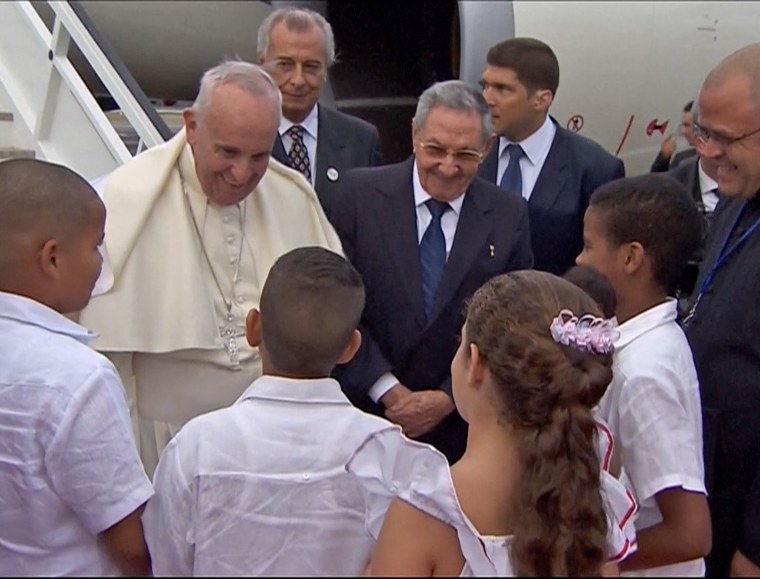HAVANA — Pope Francis hailed detente between the United States and Cuba as a model of reconciliation for the world, urging Presidents Barack Obama and Raul Castro to persevere in building normal ties as the pontiff launched a 10-day tour of the former Cold War foes Saturday.

Francis' surprisingly direct call for progress toward normalization came after weeks of Vatican assurances that he would not explicitly address politics during his pastoral trip to Cuba and the U.S. Francis served as mediator and guarantor of 18 months of secret negotiations that led to the resumption of diplomatic relations between the two countries this year.
"For some months now, we have witnessed an event which fills us with hope: the process of normalizing relations between two peoples following years of estrangement," Francis said in a speech on the tarmac of Jose Marti International Airport.
Related: For One Texas Nun, Pope Francis' Environmental Message is Personal
"I urge political leaders to persevere on this path and to develop all its potentialities as a proof of the high service which they are called to carry out on behalf of the peace and well-being of their peoples, of all America, and as an example of reconciliation for the entire world."
Francis extended his greetings to Raul's brother Fidel, with whom Francis is expected to meet as early as Sunday. He also said he wanted his greeting "to embrace especially all those who, for various reasons, I will not be able to meet" — a possible nod to political dissidents as well as ordinary Cubans across the island.
After being greeted at the airport by Raul Castro, Francis was due to rest for the remainder of the day ahead of his first big Mass on Sunday in Havana's Revolution Square, an official meeting with the Cuban president, a vespers service and his first encounter with Cuba's young people.
Like the last two popes to visit Cuba, Francis has no meetings with dissidents on his official schedule and his speeches here are being closely watched for their handling of two delicate and related topics: human rights in Cuba and the church's freedom to operate in the officially agnostic, communist state.
Francis didn't explicitly mention human rights in his speech but said he would pray to Cuba's patron saint, the Virgin of Charity of El Cobre, "for all her Cuban children and for this beloved nation, that it may travel the paths of justice, peace, liberty and reconciliation."
While he made no reference to the church's desire to be allowed to operate religious schools and broadcast on state-run television and radio, he said his trip was to help the church "support and encourage the Cuban people in its hopes and concerns, with the freedom, the means and the space needed to bring the proclamation of the Kingdom to the existential peripheries of society."
Francis is the third pontiff to visit Cuba in 17 years — a remarkable record for any country, much less one with such a small observantly Catholic community.
After flying from Cuba to the U.S. on Tuesday he will, like his predecessors, grab the world stage at the United Nations to press his agenda on migration, the environment and religious persecution.
Elsewhere in the U.S., Francis will be delivering the message that Hispanics are the bedrock of the American church.
His U.S. visit boasts several firsts for history's first Latin American pope: Francis will become the first pope to address the U.S. Congress and he will also proclaim the first saint on U.S. soil by canonizing the controversial Spanish missionary Junipero Serra.
It's largely unknown territory for the 78-year-old Argentine Jesuit, who has never been in the U.S. and spent only a few hours transiting Cuba years ago. He confessed that the United States was so foreign to him that he would spend the summer reading up on it. His popularity ratings are high in the U.S., but he also has gained detractors, particularly among conservatives over what he calls the excesses of capitalism.
That has endeared him to Raul Castro, who vowed earlier this year that if Francis kept it up, he would return to the Catholic Church.
Francis will also travel to the eastern Cuban city of Santiago to pray at the sanctuary of Cuba's patron saint and stop in the city of Holguin en route, demonstrating once again his desire to visit the places that often get overlooked.
Francis arrives in Washington on Sept. 22 for the U.S. leg of his trip, greeted at Andrews Air Force Base by the first family.